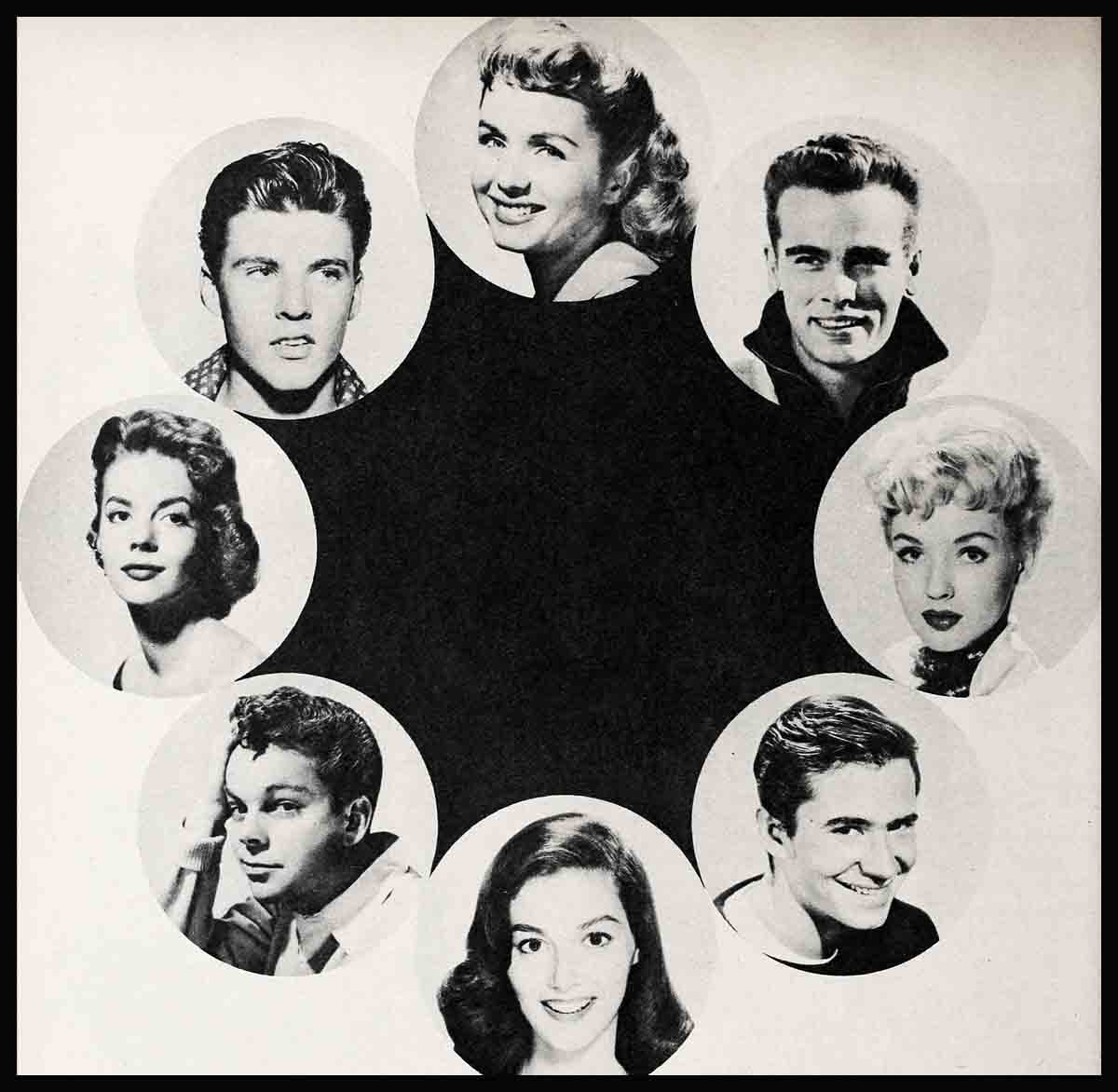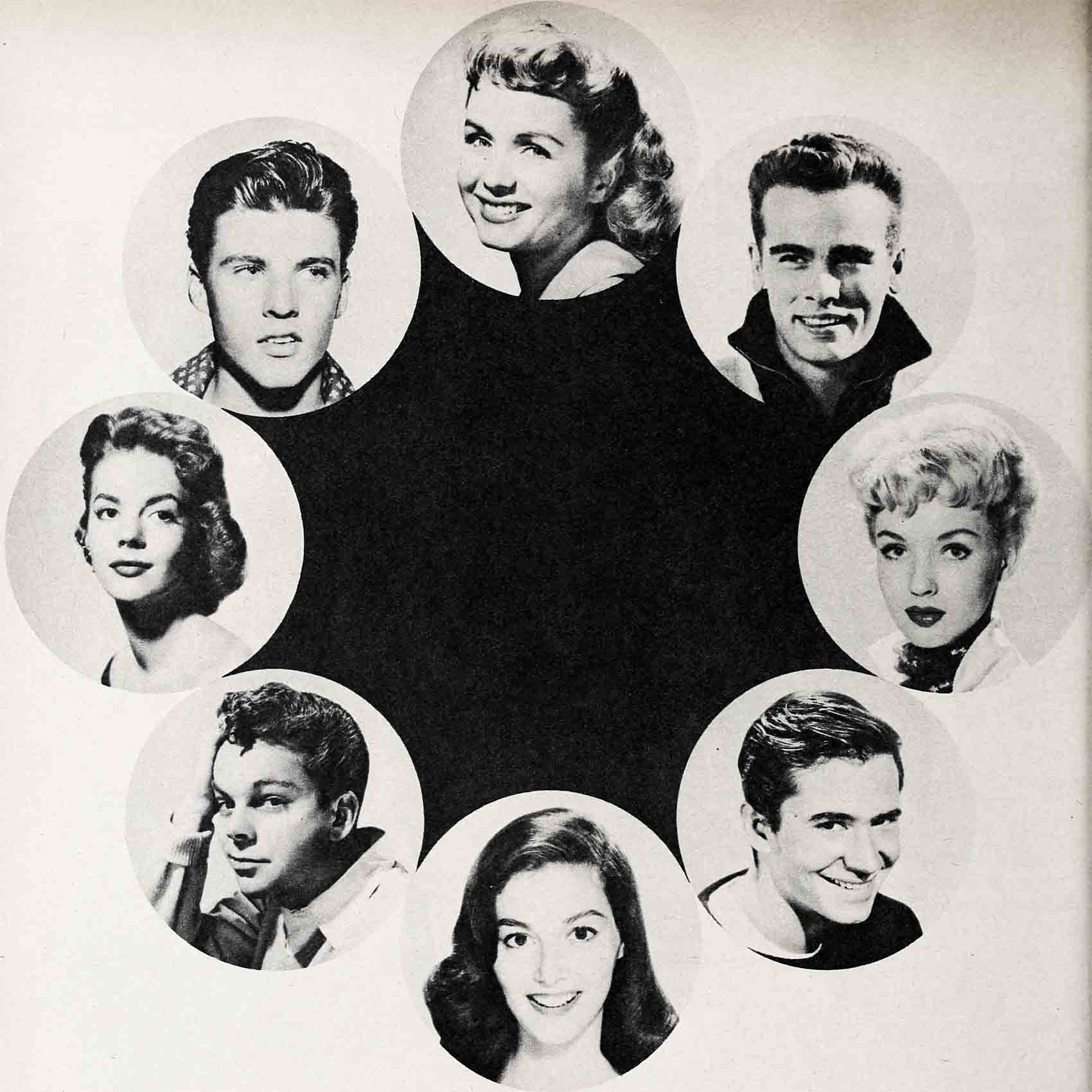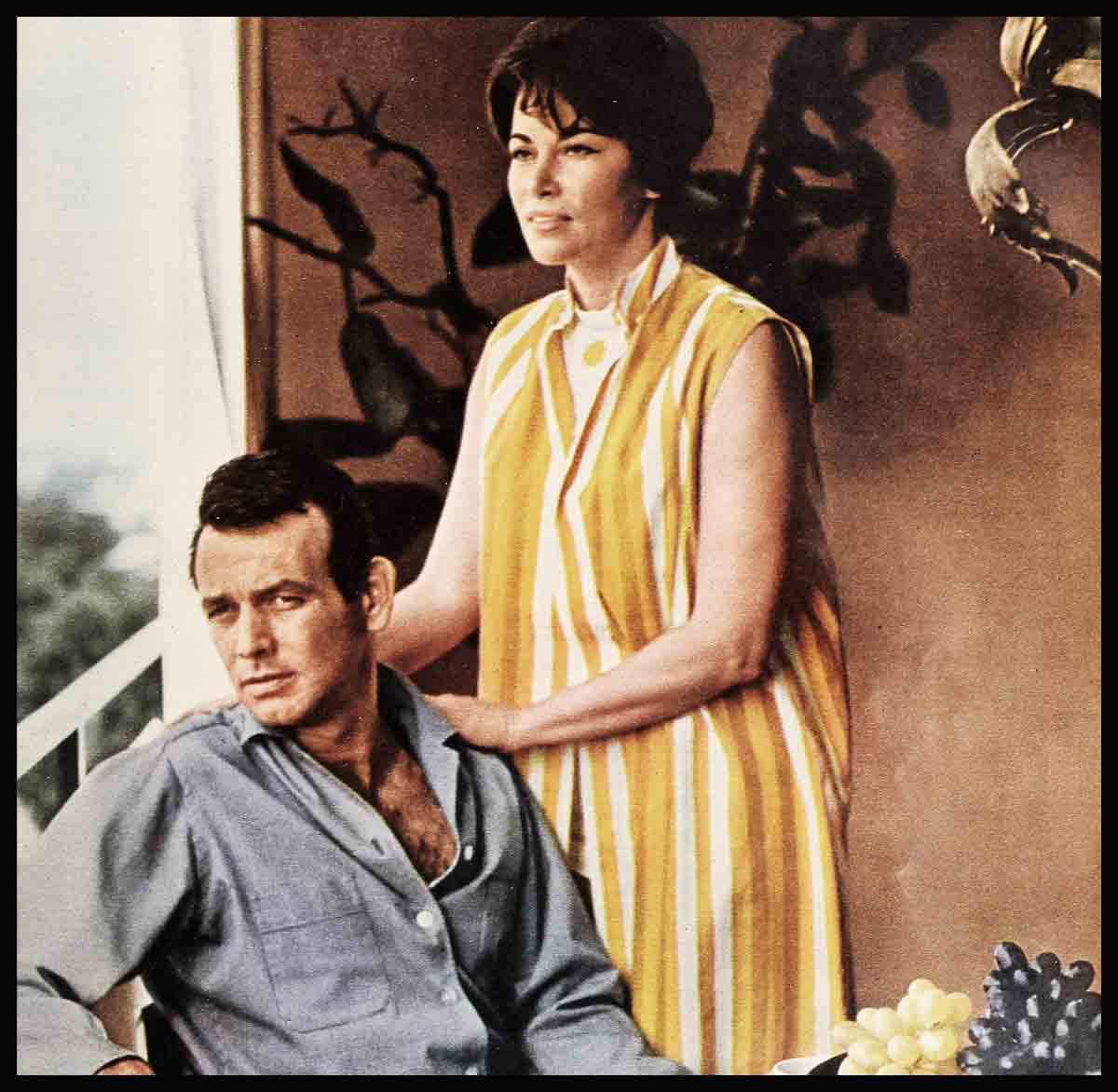
What You Don’t Know About Popularity
Choose the answer (or answers) that is most nearly correct.
You’ll find the right ones in the panel discussion opposite.
1. POPULARITY MEANS
a. Being the biggest leader and the peppiest member of the class.
b. Being the most admired and liked person in the group.
c. Having a wide circle of friends.
d. Different things at different stages of life.
2. SHYNESS IS
a. A behavior pattern that shows fear and should be overcome at an early age.
b. A personality trait that can be turned into o feminine and desirable asset.
c. Something you’re born with.
3. A “BRAINY” GIRL
a. Is usually never popular.
b. Should never try dominating her date.
c. Usually ends up by “snagging” the guy.
4. THE MOST IMPORTANT POINT TO REMEMBER IN TRYING TO BE POPULAR IS
a. Be interested in others.
b. Change your personality to suit the person you’re with.
c. Develop a great many interests so that you will “fit” into the company of all types of people.
5. YOU MOVE INTO A NEW COMMUNITY AND KNOW NO ONE IN YOUR CLASS. THE KIDS LIKE JAZZ. YOU DON’T KNOW MUCH ABOUT iT. YOU
a. Take one of them aside and ask him or her to explain jazz to you.
b. Find a book on jazz in the library.
c. Figure “I’ve never cared for the stuff; I’ll stick to classical, thanks.”
6. FELLOWS LIKE GIRLS WHO
a. Are quiet; good listeners.
b. Are smooth; make a good impression when they’re out with o crowd.
c. Are adaptable and easy to get along with; those whose company they don’t tire of.
7. THE BEST WAY TO “FORGET YOURSELF” IS
a. To throw yourself into as many activities as you can possibly squeeze in.
b. Be happy with your own appearance; wear clothes that you love.
c. Try to become friendly with os many people as you can.
May I interrupt the panel for a moment to tell a joke?” asked Dean Stockwell, and the clatter of voices grew silent. The occasion was Photoplay’s first panel discussion on the subject of popularity. Dean, Natalie Wood, Jane Powell, Tony Perkins, Venetia Stevenson, Pier Angeli, Rick Nelson and Russ Tamblyn were seated around a table, while Debbie Reynolds, gavel in hand, held forth at the head of it as moderator. Deb opened the meeting:
“Okay, Dean, let’s hear your joke. I guess we could use a laugh,” smiled Debbie.
“Well, there was a young starlet who went to see a psychiatrist, and when the doctor asked her what the trouble was, she said, ‘Everybody likes me. Wherever I go, I make new friends. Everybody thinks I’m wonderful. There must be something wrong with me!’ ” Dean threw his arms out wide, and hung his head in a gesture of mock despair. The group laughed.
“I guess I’m slow,” remarked Tony Perkins, “but I don’t see what’s so funny.”
“The point is,” grinned Dean, “that nobody would go to a psychiatrist with that kind of ‘trouble.’ Most of us want people to like us. But it would be impossible to have everyone like us.”
“Which brings us right back to the subject under discussion,” said Debbie. “I think we’ve all agreed that the definition of popularity is having people admire and like us. Right?”
“Right!” chorused the group.
“But I’d like to add one more thought,” said Jane Powell. “I think that the feeling of being accepted and liked stems from being interested in other people.”
“I’d like to add something else, too,” said Pier Angeli. “I think a person can be popular if she is humble, if she is nice to people and can make the other person feel worthwhile.”
“What do you think, Natalie?” asked Debbie, looking in the direction of Natalie Wood. “You ought to know what makes a girl popular.”
Nat wrinkled her brow and mulled the subject over for a long moment before replying. “I’d say that the knack of being able to discover what a person wants, and supplying that need, would make almost anyone popular. In other words, does the person you’re with want to be gay? Then anticipate this, and, give him what he wants—lots of laughs. If he’s quiet, don’t make with the fast talk. But,” she warned, “I don’t mean you shouldn’t have a personality of your own, too. I think it’s important to be sympathetic, good-natured and completely honest.”

Venetia Stevenson had been listening very carefully to the ideas of the others. “To me,” she said seriously, “popularity and liking and being liked all come down to one factor: security. Popularity, dating, going steady, wanting the company of both fellows and girls—and, of course, marriage, too—are all quests for security, one of the most basic human needs from infancy on.”
“Right, Venetia,” approved Debbie. “But what specifically, panel, does popularity mean to us? Having a certain number of friends? Must we have lots of friends to be popular? How many? Everyone? Let’s talk about this a few minutes.”
Dean raised his hand. “Certainly, everyone can’t like us, and we wouldn’t want them to. I think it’s much more important to have a few good friends. Those are the ones we’ll probably have through life.”
“A person who wants everyone to like him is insecure,” agreed Tony Perkins.
The panel was quiet a few moments, and then Debbie turned to the boys and asked, “What makes a girl popular? What makes you want to ask her for a date?”
Russ Tamblyn volunteered. “Speaking from the masculine point of view,” he said, squaring his shoulders to underline his statement, “I think adaptability will make a girl popular. I like a girl who’s at home anywhere, whether she’s at a formal party or a picnic.”
“True,” seconded Tony. “I’ll vote for that.”
“But I think the most important thing,” continued Russ, “is the ability to accept yourself. When you can do that, other people will, too.” His face broke into a wide grin. “That’s nice to know. isn’t it?”
“What if you have a liability, like timidity or shyness? What do you think you can do about that?” asked Debbie.
“Well, if you have a liability,” answered Russ, “other people won’t place much importance on it if you don’t. For instance, if you’re shy with strangers and find it hard to talk to people at a party, you could make a joke of it when you get there—maybe say, “The quiet one has arrived. Nine times out of ten this will break the ice for you. People like to talk about themselves. Or if you talk to someone about himself, often you’ll find him warming up to you almost immediately.”
“Do you feel shy in a room full of strangers, Janie?” inquired Debbie.
“I have a trick I’ve taught myself,” Jane Powell answered. “Yes, I still feel shy when I get to a party where there are lots of people I don’t know. I’m not the kind of person who can walk up to a stranger and make small talk. So what I usually do is to wait for the host or hostess to introduce me to someone, and then I tell myself that he or she might be equally shy and find it equally difficult to talk. That helps me work at keeping the conversational ball rolling. And it works!”
That’s helpful, all right,” Debbie nodded. “But I have another question. I’d like to know what’s wrong with being shy, anyway? I know lots of shy girls who hold a certain appeal for both fellows and girls. And shyness can definitely be turned into an asset. It can be a charming feminine ‘plus.’ ”
“I agree,” said Dean. “A quiet girl or one who’s shy can sometimes make a guy feel important.”
“Sure, take Venetia, for instance,” offered Tony. “She’s shy, and yet she’s not exactly sitting home waiting for dates!” Tony’s admiring look made Venetia lower her eyes.
“I think we agree that shyness can be an asset as well as a liability,” said Debbie, “depending on what we do with it. What qualities do you like in a girl?” she asked Dean. “What makes for a good date?”
“I like a girl who’s quiet and friendly and a good listener,” Dean answered. “If she’s got something on the ball, a fellow will notice it by her manner. He doesn’t have to be hit over the head with a sledge hammer. Too many girls expound on all sorts of subjects on a date, and before they’re asked. I prefer one who’s a bit retiring until she has something worthwhile to contribute. Of course, this goes for fellows, too,” he added with a grin.
“Good answer,” said Debbie, winking. “And now let’s hear what a girl has to say. What qualities does a girl look for in a boy? What would you say, Pier?”
Pier thought a moment, and then answered slowly, “I think a young girl likes a fellow who’s a bit sophisticated. Not affected, but one who seems to know where he’s headed; one who can make the important decisions and sometimes surprise you by making them without asking you first!”
“I guess it’s typically feminine to want a strong shoulder to lean on occasionally,” added moderator Debbie. “How about you boys? Do you like ‘older women?’ ”
“Rick does!” teased Russ.
“Huh?” Rick Nelson said, flushing.
“Well, you used to date only the young girls at high school. But then you seemed to get interested in the older, more sophisticated girls. Right?”
“Uhhh—well, yup, I guess you’re right,” Rick laughed. “I meet ’em on our family TV show!”
Debbie stepped in again. “And now here’s a question from one of Photoplay’s readers that should interest you: ‘Do you think a brainy girl can be popular?’ ”
Natalie raised her hand and took the floor. “Yes, with brainy people! It’s important to a boy that the girl he dates be intelligent, I thine. Too many teens are afraid of being labeled ‘bookworm.’ I think this idea is all wet. A fellow likes a girl he can talk to. He’s anxious to hear her ideas on a subject. Besides,” she added with a twinkle, “it’s the smartest girl who snags her man!” Everyone laughed.
“I think a happy medium is the answer here,” said Debbie. “A bright girl is always respected, and the bookworm can certainly shine in a group, as long as she’s not dogmatic or overwhelming. Should a bright girl compete with her date, boys?”
“I like an intelligent date, and sure, she can compete with me,” answered Rick. “What’s the use of trying to hide brains? Of course, she should retain her femininity at the same time.”
“What about interests?” asked Debbie. “I know a girl who complained that the boys never asked her to play tennis or go skating with them. Well, it turned out that my friend had only the vaguest notion of how to go at these sports. So I suggested she find a book on tennis. She did, and every day after school she’d practice hitting tennis balls against her garage door with a borrowed racket. Within a few months she had tried out for and joined the girls’ tennis team at high school and was raising her fellow classmates’ eyebrows—girls and boys—when she played against other teams. Moral: Develop yourself by developing your interests and potentials.
“If your crowd likes jazz and you don’t know beans about it but would like to, do a bit of private research on the subject. Spend an hour or two at the library reading up on it. If a guy in your history class who’s interested in modern art intrigues you, become an expert on the subject he loves, and who knows, maybe he’ll want to become an expert on you!”
Debbie recognized Venetia. I’d like to add one more bit of advice: ‘Forget yourself.’ I think that’s a big thing. That’s why I think it’s so important to be well- groomed. When you’re out on a date or at a party, if you’re sure that your hair is becoming, that your seams are straight and that your dress is pretty, you can go ahead and forget all about yourself and concentrate on the other person—and other things. It’s easier not to be self-conscious when you feel you look right.”
Debbie continued, “That brings us to our next question from a Photoplay reader: ‘Does a girl have to be pretty to be popular?’ Let’s hear from a man on this one. What do you think, Tony?”
“Holey moley, what a question! Of course not! If she’s nice and interesting and friendly, I’ll like her. But naturally she should be neat and as nicely dressed as she can.”
Rick Nelson added his opinion: “I like a girl who’s slim. And I don’t like girls who talk too much. That’s really the only trait I dislike in girls.”
“Then the nice thing about popularity,” summed up Debbie, “is that it’s something that can be acquired. Nobody’s born with it. You don’t have to be beautiful, rich or handsome. You simply have to show a little interest in yourself, enough to want to look attractive to other people, and show lots of interest in the other person. Is that right?”
“Right!” chorused the girls.
“I don’t know, but sometimes I think , we give too much emphasis to the subject of popularity,” objected Dean Stockwell. “Sometimes, it seems to me, people behave in a way they don’t want to, and feel they have to go along with the crowd because they want to be liked.”
“But popularity doesn’t mean being over-anxious to be liked,” exclaimed Jane.
“No, but what I mean is that sometimes you can’t conform blindly to the group,” Dean continued. “Sometimes you have to take a stand of your own, even if it means that certain people won’t like you for it. There are times when you have to have the courage of your own convictions.”
“Of course,” agreed Tony.
“You don’t have to follow the group blindly in order to be popular,” objected Russ, with feeling.
“You don’t have to behave like a sheep!” cried Jane.
The discussion had grown heated, and Debbie rapped her gavel for order.
“Maybe you’d better explain what you mean, Dean, about not conforming blindly.”
“Well, take sex, for instance. Sometimes a girl thinks she has to go along with the crowd in order to be popular,” explained Dean. “She thinks if she doesn’t go steady she won’t be popular. Or if she doesn’t neck—” he waved his arms and shrugged his shoulders helplessly.
“To neck, to neck, just to neck,” exploded Pier. “How I hate that word! If you want to be close to a boy that you really like, then your feeling has meaning. But I don’t think you should kiss him until you are at least eighteen. That is my Italian upbringing perhaps, but it is what I believe.”
“I agree with you, Pier,” added Russ. “ ‘Neck’ isn’t a particularly good word. But if you’re attracted to someone and sincere about it, then I think it’s all right to kiss. After all, it’s perfectly natural for boys and girls to be attracted to each other.”
Jane Powell added her thoughts. “A girl who’s promiscuous gets to be unpopular with the people who really count.”
Debbie looked at her watch. “I see our time is almost up, so let’s stop now and sum up this discussion on popularity.”
The group gathered around Debbie, and she wrote down their suggestions on a pad. They talked and shouted and agreed and disagreed, and when they were finished, they had five good points that should help anyone who wants to “belong” and be popular. Here they are:
1. KNOW YOURSELF Know what your good points and your weaknesses are. Make the most of your strong points and try to cover up your deficiencies. In other words, maximize the maximum and minimize the minimum.
2. DEVELOP YOURSELF Discover new interests and people. Turn curiosities on any and all subjects into knowledge. You’ll be more interesting company and have more friends for it—of both sexes!
3. BE YOURSELF It was Shakespeare who said, “To thine own self be true, and it shall follow as the night the day, thou canst not then be false to any man.” And it was every single member of the panel who said, “Be sincere.”
4. ACCEPT YOURSELF If you think you’re a worthwhile person and nice to get to know, other people will take the time and trouble to do so.
5. FORGET YOURSELF This, perhaps, is the most important rule of all. If you’re able to concentrate on the other person, learn what he thinks and feels and wants, and accept and understand him, he’ll accept and understand you. There’s a quotation from the Bible that says, “Only as ye lose yourself shall ye find yourself.” And when you lose yourself in those around you, you find the true meaning of happiness—and, incidentally, popularity.
THE END
It is a quote. PHOTOPLAY MAGAZINE FEBRUARY 1958





zoritoler imol
24 Nisan 2023Would love to forever get updated outstanding web blog!